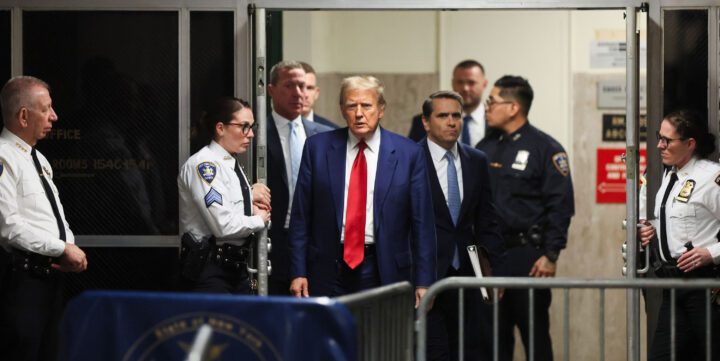The Global Impacts of a US Withdrawal from the WHO
February 19, 2025
Australia’s Health at a Crossroads
When Donald Trump handed over a folder containing an executive order to withdraw the United States (US) from the World Health Organization (WHO) in January, he reportedly exclaimed, “Ooh, that’s a big one!” That moment, combined with several other early executive actions, signalled a hard pivot in US global health policy — one that could reverberate across the world, including here in Australia.
Although this move had been hinted at as far back as 2020 during Trump’s first term in office, the official 12-month notice period for US withdrawal from the WHO is now well under way. Global health experts are warning that the ramifications could be both immediate and long-term. From undercutting decades-long progress on communicable diseases such as HIV, malaria, and tuberculosis, to weakening global coordination in confronting pandemics, the US decision stands to reshape the international health landscape. For Australia — a country with a strong track record of public health leadership — the question now becomes: what does a diminished WHO, absent its largest donor, mean for our security, partnerships, and ability to respond effectively to global and regional health threats?
The Crucial Role
The WHO is mandated to coordinate the global response to health emergencies, develop evidence-based guidelines, and provide technical and financial support to lower-income nations. It also houses expert networks that assess new pathogens and maintain surveillance for dangerous outbreaks.
According to figures cited by health law specialist Lawrence Gostin (Georgetown University), the US historically contributed up to 18 percent of the WHO’s overall funding — roughly $US1 billion (AU$1.6 billion) each year. That money underpins vital immunisation programs; supports maternal and child health initiatives; and helps coordinate the WHO’s emergency response teams. The organisation’s total annual budget has been around $US6.8 billion, meaning the US withdrawal leaves a substantial funding gap that cannot be easily replaced.
Experts worry not just about the immediate shortfall in funding, but also about the erosion of collective preparedness against future outbreaks. With the WHO being “the preeminent international health organisation”, US withdrawal removes a crucial partner in designing, deploying, and financing strategies to fight global health threats.
Justifications and Tensions
Trump’s executive order cites the WHO’s alleged “mishandling of the COVID-19 pandemic,” an assertion first levelled by the administration in 2020. Additionally, the order laments “unfairly onerous payments” and “inappropriate political influence” by certain member states, with Trump specifically pointing to China.
“The World Health Organization disgracefully covered the tracks of the Chinese Communist Party every single step of the way,” Trump said in a video in 2023. However, the WHO has countered by asserting it does not have legal authority to force China or any other country to share data or conduct investigations. Publicly, WHO officials have consistently called for transparency from Beijing on COVID-19 origins.
While some critics note genuine areas of improvement for the WHO’s pandemic response, many experts believe the US withdrawal will hamper reforms rather than facilitate them. Suerie Moon, co-director of the Global Health Centre at the Geneva Graduate Institute, calls the reform argument a “red herring”. She highlights that the WHO’s processes for change are guided by inputs from its 194 member states — a process the US is now stepping away from. As a result, reforms that the US might have championed or critiqued around pandemic preparedness, vaccine distribution, or data-sharing may now progress without one of the world’s historically most influential players at the table.
Potential Gains
Critics of the US withdrawal believe this could accelerate China’s influence within the WHO.
China has already signalled it will continue supporting the WHO and strengthen international public health cooperation. While Germany, the United Kingdom, and other European countries also contribute significantly, the US had long shaped WHO priorities — through both funding and scientific expertise. A relative US absence could tilt future negotiations on issues like vaccine intellectual property rights, disease surveillance, and research collaborations in favour of emerging economies keen to expand their influence.
Implications for Australia
Australia’s health security is intertwined with global coordination. We benefit from real-time disease surveillance and the WHO’s research and regulatory guidance. Our contributions and leadership within WHO forums reflect Australia’s broader geopolitical interest in a stable Indo-Pacific region.
Moreover, travel between Australia and the US is extensive. If the US, lacking direct engagement with WHO protocols, falls behind in controlling potential outbreaks, the risk of transmission to Australians could rise — especially considering Dr Heffernan’s warning that “with USA international travel, this potentially increases the disease risk for Australia making everyone globally vulnerable.”
For Australian institutions and experts who have long collaborated with US public health agencies (such as the Centres for Disease Control and Prevention), the synergy facilitated by WHO frameworks could become more complicated. The new US position may hamper joint research initiatives, data exchanges, and coordinated responses to health crises, particularly in the Asia-Pacific region.
A Shifting Global Landscape
The WHO’s reliance on voluntary contributions leaves it vulnerable to political shifts by major donors. Even after the US fully withdraws, it may not be able or willing to reclaim its influential seat in the near future. Reports on Trump’s withdrawal notes that the US share typically comprised 15-18 percent of the WHO budget (KFF Health News, 2025). While the Bill & Melinda Gates Foundation is also a top donor, its funds are often earmarked for specific diseases, such as polio.
Without the US, some experts believe the WHO’s budget will shrink, forcing it to scale back programmes that benefit the world’s poorest populations. Others, like Ayoade Alakija of the Africa Union’s Vaccine Delivery Alliance, see potential opportunities for new leaders to fill the funding and policy gaps, thereby redressing global health inequities. “Power is shifting hands,” Alakija observes, suggesting this might lead to a “more equitable and fairer world in the long term”.
For decades, we have contributed expertise in pandemic preparedness, immunisation campaigns, and health systems strengthening, particularly across our Pacific neighbourhood. If the US withdraws from the WHO, there is scope — and arguably an imperative — for Australia to collaborate with like-minded partners (including Germany, Japan, and the UK) to ensure essential WHO functions remain funded and effective.
Next Steps
The US decision to exit the WHO carries immense global repercussions, from project funding shortfalls to a realignment of influence in international health governance. For Australia, the end of the US-WHO relationship introduces uncertainty about disease surveillance, outbreak management, research collaboration, and health equity. The COVID-19 pandemic laid bare how a single pathogen can disrupt economies, healthcare systems, and social structures worldwide. In light of that lesson, weakening collective health institutions appears profoundly risky.
As a comparatively small country with a strong public health track record, Australia has the chance to fill leadership vacuums and reinforce collaborative health responses. If we fail to do so, we risk both our national health security and the broader stability of regions where our partnerships and humanitarian efforts are crucial. The WHO’s mission — to unite nations in the fight against disease and poor health — has never been more relevant.
Heffernan, M (RMIT University) 2025, Commentary on public health policy, RMIT University, Melbourne, https://www.rmit.edu.au/news/media-releases-and-expert-comments/2025/jan/us-who-withdrawal
KFF Health News 2025, Trump pulls US out of WHO; UN braces for a funding shortfall and a tougher stance on global agencies, KFF Health News, https://www.kff.org/global-health-policy/fact-sheet/the-u-s-government-and-the-world-health-organization/
US withdrawal from WHO is unlawful and threatens global and US health and security, Gostin, Lawrence O et al. The Lancet, Volume 396, Issue 10247, 293 – 295, https://www.thelancet.com/journals/lancet/article/PIIS0140-6736(20)31527-0/fulltext












